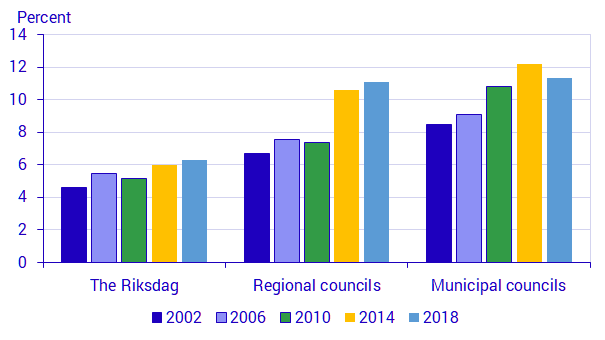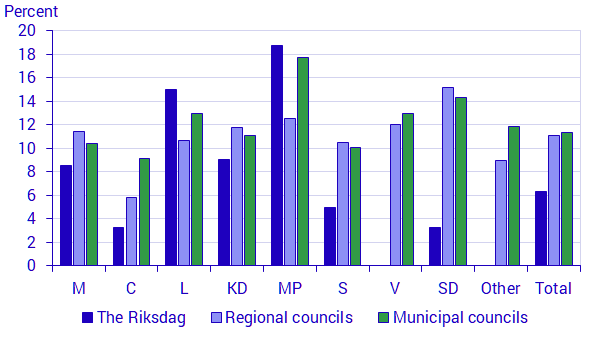General elections, nominated and elected candidates, 2018, resignations two years into the electoral period
Somewhat fewer resignations from municipal councils
Statistical news from Statistics Sweden 2021-01-27 9.30
Two years into the electoral period, the proportion of resignations has decreased in municipal councils, while it has increased somewhat in the Riksdag and regional councils, compared with the previous electoral period. Resignations at regional council and municipal council level are most common among young elected officials, according to the statistics.
The proportion of elected representatives who have resigned from their political office two years into the electoral period is roughly the same in municipal councils and in regional councils, at 11 percent. In municipal councils, this is a minor decrease compared with the previous electoral period, while in regional councils, this is a minor increase. Among members of the Riksdag, 6 percent have resigned after two years. Two or more electoral periods ago in the 2000s, resignations two years into the electoral period increased in all political assemblies.

In municipal councils and regional councils, resignations are somewhat more common among women, while in the Riksdag, resignations are slightly more common among men.
In municipal councils and regional councils, it is considerably more common for young people below 30 years to resign. In the youngest age group, the proportion of resignations is 22 percent and 19 percent, respectively, two years into the electoral period. In the Riksdag, on the other hand, there have been no resignations in the age group 18-29 years two years into the electoral period.
Green Party has the highest share of resignations in the Riksdag and in municipal councils
In the Riksdag, the highest proportion of resignations after two years is among the Green Party, followed by the Liberal Party. In regional councils, the Sweden Democrats have the highest proportion of resignations, followed by the Green Party. In municipal councils, resignations are most common among elected representatives from the Green Party, followed by the Sweden Democrats.

An elected representative may resign from their political office before the end of the electoral period for a variety of reasons. During the 2010-2014 electoral period, Statistics Sweden carried out surveys to examine the reasons for resignations and the results are presented in the report ‘Demokratins representanter’ (only available in Swedish). The report shows that resignations are, above all, based on personal reasons. Personal reasons include health, work and family conditions, as well as moving away from the municipality.
Definitions and explanations
The Election Authority regularly published information on candidates who resign from their political office during the electoral period, as well as who replaces them. Statistics Sweden’s statistics on resignations among elected representatives are based on the Election Authority’s data. Statistics Sweden’s statistics on resignations only presents resignations among officials who were elected in the elections, not resignations among substitutes. Resignations between 2018-09-09 and 2020-09-09 are presented here.
Statistical Database
More information is available in the Statistical Database
Feel free to use the facts from this statistical news but remember to state Source: Statistics Sweden.
